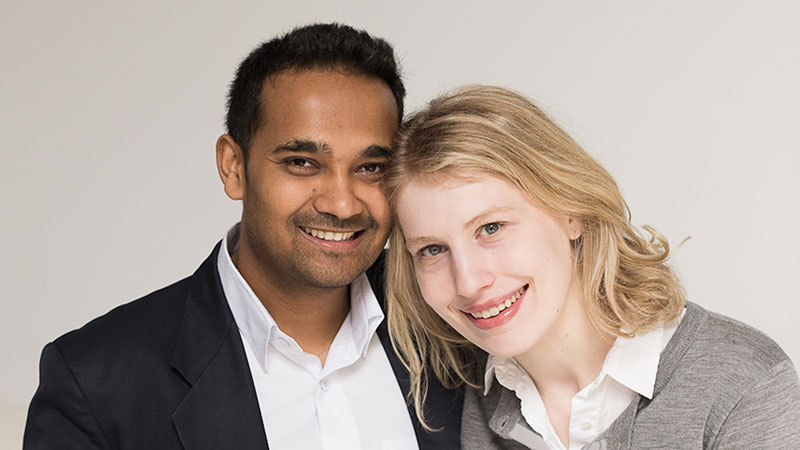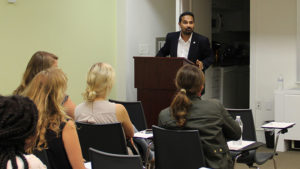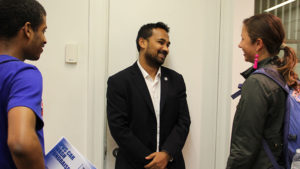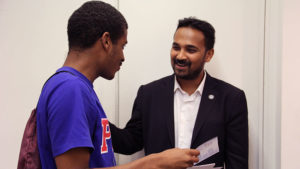
Alumnus Ravi Kumar (IPVS 09, PPF 13) has come far in his life, both geographically and career-wise. He began as a boy in a remote village in Nepal. That is a far cry from where he is today – a lead digital strategist at the World Bank in Washington, D.C., the co-founder of a poverty-fighting nonprofit and one of Forbes magazine’s 30 Under 30 social entrepreneurs for Asia in 2017. He points to his experience in the Institute on Philanthropy and Voluntary Service (IPVS) as one of the influences on his life and way of thinking about international aid. Now, he is helping people living in poverty in Nepal help themselves and each other through the nonprofit, Code for Nepal, which he founded with his wife, Mia Mitchell.

In 2017, Forbes Magazine honored Kumar and Mitchell on the magazine’s “30 Under 30 – Asia – Social Entrepreneurs” list for 2017. The distinction is the result of their vision, hard work, networking and the generosity of the volunteers who give their time to make Code for Nepal a success. However, Kumar also calls it a sign of the investment TFAS makes into selecting and educating each student. He feels his TFAS experience played a part in his success so far – and he looks forward to continuing to invest in the rising generations of TFAS students, as he invests in the future of his homeland.
Kumar came to speak to TFAS students during the summer of 2017 and shared his story of service to his home community. He talked about Code for Nepal’s aims and how it came to be.
“Code for Nepal is a U.S.-based nonprofit that works to digitally empower Nepal, increase the use of open data and increase digital literacy especially [among] women and minorities,” Kumar said. “We help people get access to data about their society, so they can understand their society’s challenges and get the tools to organize themselves to tackle local challenges.”
I was inspired to give back to society when I was at TFAS, in IPVS, and also because of my background. I made a commitment to give back.”
– Ravi Kumar (IPVS 09, PPF 13)
“I grew up in a remote area,” Kumar said. “I didn’t have access to the internet regularly until I came to the U.S. in 2007. In the area I was born, there is a high level of illiteracy and a digital divide even today, so I am aware of and very familiar with the challenges people face.”
From Digital Division to Data-Driven Unification
The idea of addressing the digital divide grew out of a trip Kumar and his then-girlfriend Mitchell took to meet his parents in Nepal in 2014. Kumar and Mitchell witnessed the extreme poverty of some of the remote areas, where education was inadequate and economic opportunities, especially for women and disadvantaged people, were scarce. They also observed that the average Nepali citizen had much less access to and knowledge of the internet than Americans do.

Understanding the power of an internet connection, Kumar and Mitchell returned to the U.S. with two missions: One, to increase digital literacy in Nepal, and two, to increase access to open data all over the nation. They laid the groundwork for a nonprofit to accomplish these goals in 2014 and registered in 2015.
The methodology of Code for Nepal is innovative. Kumar said, “We don’t produce data ourselves, beyond crowdsourcing and surveys. We get interesting data from the government, UN agencies and other institutions. We gather the data, analyze it for trends and publish the results, as well the clean data.”
Kumar made the point that even if data is available on a particular topic, such as poverty statistics or information about clean water access, it is not always in an interpretable form.
“How is a 21-year-old college student supposed to find time and resources to analyze the data?” That is where Kumar, Mitchell and their volunteer data analysts from across the U.S., Nepal and India enter the picture, making the information both accessible and understandable.
IPVS was a very, very formative summer experience …. It shifted my thinking and gave me a clear picture of what I should be doing next.”
– Ravi Kumar (IPVS 09, PPF 13)
Code for Nepal piloted the website Nepalmap.org, to give citizens access to the entire census of Nepal in an easily usable and shareable format. In another project, Kumar, Mitchell and their band of volunteers launched AskNepal.info, a portal to increase access to information in Nepal by enabling Nepalis to obtain data from government agencies. More than 100,000 journalists, researchers, students and others have viewed the website since the launch and the feedback has been very positive.
“We give out scholarships, too,” he said. “Such as scholarships just for young women to learn coding and for people with diverse backgrounds, because we want to make sure people get access to digital literacy and have training. We apply for grants and do fundraising for the scholarships. We have friends who use their birthdays as a chance to raise money for us.”
Igniting the Torch of Service in Rising TFAS Students

During his recent visit to the TFAS classroom – this time as a speaker – Kumar remarked he was inspired to see young people who were willing to ask questions and listen to others. At first, he was unsure how the students would receive him – after all, he is not what he calls a “D.C. expert” or the president of a large or venerated NGO. He was the first in his family to go to college and leads a young and small nonprofit.
However, Kumar was delighted when the students greeted him with curiosity and excitement about his ideas, his work with Code for Nepal and his thoughts about international aid. Some of the students even asked to meet with him later for more advice on networking, starting nonprofits and public service in general. They struck him as driven, service-minded individuals – and they continue to keep in contact with him now, which he also finds impressive.
Influence of the IPVS Experience
Kumar’s own TFAS journey began when he was in college at Buena Vista University in Iowa, looking for ways to learn more about NGOs and how they play a role in helping address unmet needs. A professor suggested Kumar consider TFAS, so Kumar did his research and realized the Institute on Philanthropy and Voluntary Service (IPVS) would provide the NGO and nonprofit experience he was seeking.
“It was a very, very formative summer experience,” Kumar said. “Every week or so, we would get introduced to different leaders from NGOs and nonprofits in the D.C. area and we would talk about international development. Since I came from a humble background, I could relate by being someone from a developing country and also being someone who wanted to work in international development. It shifted my thinking and gave me a clear picture of what I should be doing next.”
I’ve been so privileged to have access to education and opportunities and to be where I am, so I have a moral obligation to help others – and I enjoy it, too.”
– Ravi Kumar (IPVS 09, PPF 13)
After his TFAS summer, Kumar returned to Buena Vista University and graduated early, then moved to New York City to work at a nonprofit that was rebuilding schools in rural Nepal. He then attended Columbia University and earned his master’s degree, eventually moving back to Washington, where he has settled for the moment and is focused on his work for the World Bank and growing Code for Nepal.
Code for Nepal Moves into the Future
In the past two years, Code for Nepal has taken off. Kumar and Mitchell have their hands full seeking out new opportunities to help people in Nepal, and also welcoming and onboarding new volunteers. Kumar said, “We are expanding really fast, because there are so many people who need the services we provide, but also because there are so many people who believe they can help by being a digital volunteer.”
“We’ve been very lucky,” he said. “There are a lot of young people who just want to help, even if they have no connection to Nepal. Everybody wants to be part of a solution.”
With Code for Nepal growing so rapidly to meet the needs of a changing world, Kumar and Mitchell are scaling up their vision. Kumar says that having access to data and understanding how internet technology works are a good first step, but the next is to show people how to use the data to identify and solve problems suggested by the information. They are now looking for ways to conduct outreach into schools and universities outside of Kathmandu to teach young people how data can become a tool for positive change.
In addition to outreach into the education system, Kumar envisions partnering with private companies and the public sector in Nepal to ensure that graduates of the Code for Nepal programs can secure jobs. If they can begin utilizing their new skills, they will be able to lift up their communities as well as support their families.
“I’m thinking, ‘How do I continue to contribute to society?’” Kumar said. “Because I’ve been so privileged to have access to education and opportunities and to be where I am, so I have a moral obligation to help others – and I enjoy it, too.”
To learn more about the Institute on Philanthropy and Voluntary Service (IPVS) that impacted Ravi Kumar and helped him dream higher in his mission to serve, visit the IPVS program page. To learn more about Code for Nepal or to get involved, visit the Code for Nepal website.

